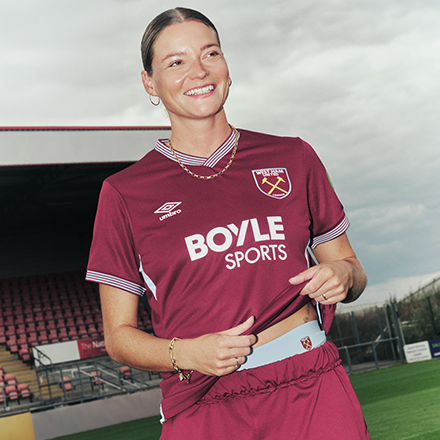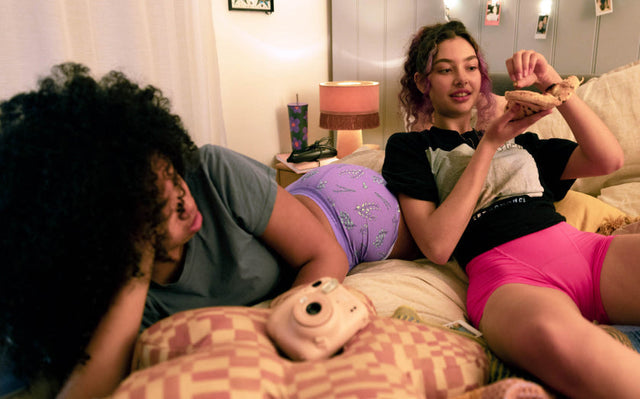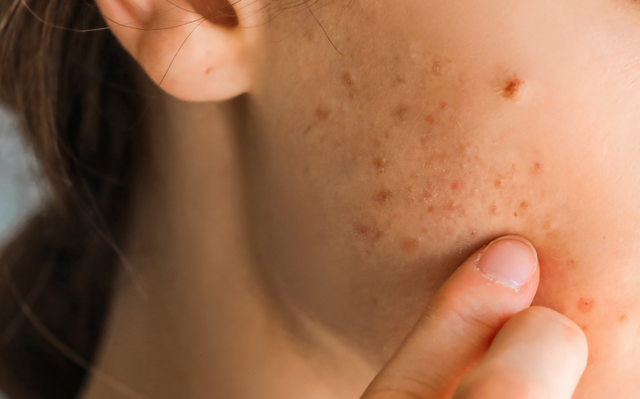Your first cycle: why there’s no such thing as ‘normal’
Periods and unpredictability: name a more iconic duo. And feeling unsure about your first cycle is even trickier because anything goes when it comes to periods and regularity.
Although generally beginning around the age of 12, your first period can start anywhere from 8 to 17. Once it does, it can take years for it to settle down and get consistent. So having loads of questions about what a period should be is totally common.
Is it normal to miss a period? How long do they last? And, oh, what to do if periods are late? These are just a few things you might be wondering about your first menstrual cycle, and we love that because we’ve all been there. To ensure you’re ready for your first period, here’s what you need to know about what to expect and how to prepare for irregularities.
First cycle: signs that it’s coming
Waiting for your first cycle can be an anxious time, but sometimes your body might give you hints that it’s getting closer. Dr Kavipriya Soma is a trained GP obstetrician from the Athena Women’s Clinic. According to her, many common signs indicate your first cycle is about to start.
“Tummy aches, pains and mood swings are all common,” she explains. “Some people also get a vaginal discharge that starts before the first period and then the period itself.”
Among the signs your period is coming tomorrow, discharge is just one to be mindful of. Here are some other premenstrual signs and symptoms to keep in mind:
- Acne
- Sore breasts
- Sore back
- Food cravings
- Upset stomach
- Bloating
- Feeling emotional or irritable
For some there might be no warning at all, so arming yourself with the facts is a great way to prepare.
What to expect during your first period
Your first period, known as ‘menarche’, results from puberty. As the menstrual cycle begins, your body produces more estrogen.
This estrogen causes the uterus lining to thicken (assuming it’s preparing to support a fertilized egg). But when there’s no egg, the lining breaks down and pushes out of your uterus, resulting in menstrual bleeding.
Even with the facts, navigating periods can be tricky. So to help, we’ve answered some common questions to cover the basics of what to expect with your first cycle.
How late can a period be?
A menstrual cycle is usually between 21 and 35 days, with 28 being the average. But it’s possible to skip a period in the time around your first cycle. If you have regular periods, but they’ve stopped for 3 months, speak to a trusted adult or health professional.
How much blood will there be?
Your first few cycles could be light and might only be spotting. As your cycles become consistent, the total blood loss is around 60ml each period, even though it can feel like a lot more. Modibodi’s Teen undies come in different absorbency levels to suit all kinds of bleeding. They include Super, Moderate and Light for whatever your body needs.
Unsure of your flow? We recommend trying our Super absorbency, as it’s always better to be over protected.
How long do periods last?
Your first period might only last a few days (sometimes less). Other times it can feel like you have periods every 2 weeks. Once your hormones have settled, you can expect them to last between 2 to 7 days.
There’s no such thing as a ‘normal’ first cycle
Just as our bodies are all different, our periods are too. And having a period is less about what everyone else is doing and more about what’s normal for you.
It can take up to 6 years for your period to become more consistent. And many factors can impact your menstrual and ovarian cycle, including illness, weight change and stress.
“Any external or internal stress can impact your cycle,” says Dr Soma. “Your environment, physical conditions, psychological conditions and subtle differences can all affect it. That’s why it varies from person to person.”
Another cause of irregular periods is due to anovulatory cycles. Dr. Soma explains.
“Teenagers’ eggs are not mature enough to undergo cyclical changes every month to release an egg. So in a cycle where the egg isn’t released, the womb’s lining continues to grow but outgrows its blood supply.” When this occurs, she says the top of the lining can decay and cause an irregular period.
Preparing for your first period
Periods can come at any time, and there’s no crystal ball to tell us when that might be. So arming yourself with some basic period accessories can help minimize the uncertainty. Here’s how.
Pack a period kit. Like a scout, it helps to be prepared. A simple kit in your school bag consisting of your choice of period products, a clean pair of undies and some paracetamol is a good start. Our bikini and boyshort period kits have everything you need to be physically and mentally prepared for your period.
Period undies. Think your period is on its way? A pair of Modibodi period undies will work a treat. Plus they’re comfy enough for everyday wear and absorb sweat, discharge and pee, even if you’re not sure your cycle is about to start.
Keep a cycle diary. Tracking your period is easy with all the apps available. Otherwise go old-school and manually track your cycle with paper and pen. This helps you get in touch with what your ‘regular’ is.
Have someone to talk with. Whether it’s your doctor or any adult you can speak with openly, it’s great to have a sounding board when you need to have convos about your period. Uncertainty about which products to use, irregularity, what to expect or a period interfering with your daily life are all worth discussing.
The first steps to period prep
Navigating your first cycle can be tricky, but it’s nothing to be ashamed about. Whether you’re a parent supporting your child through their first period, or experiencing it yourself, Modibodi’s Teen period undies are an excellent way to take the uncertainty out of periods, so check out the cute, comfy range today.






